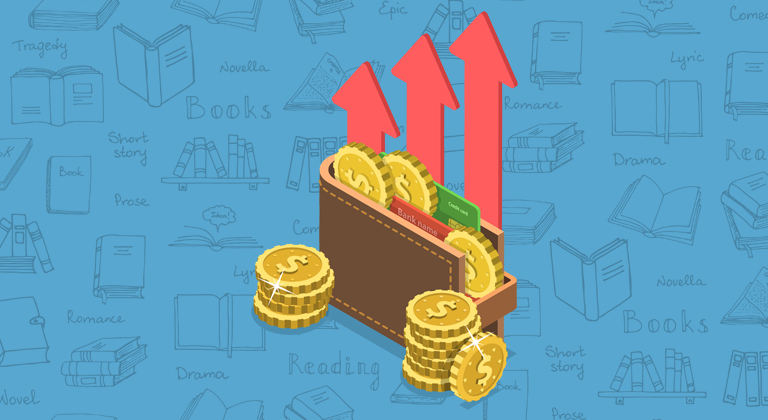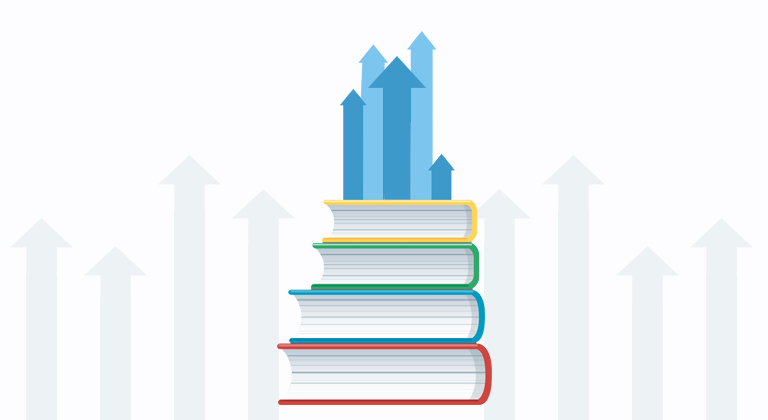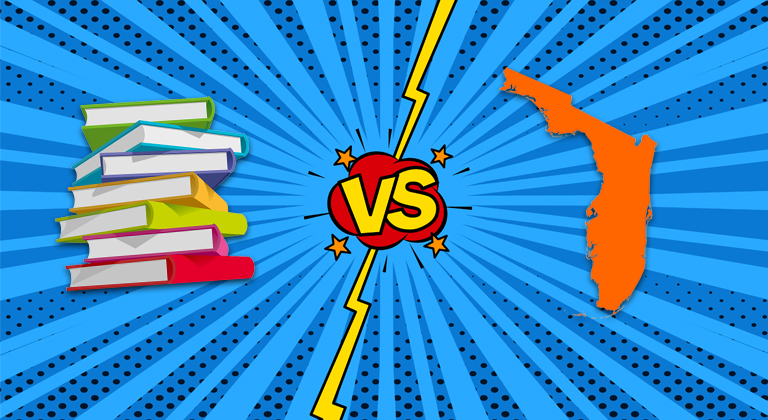What 3 things can we learn from the Kindle Unlimited price hike?
This May, Amazon announced the first Kindle Unlimited price increase since it’s inception, taking subscriptions from $9.99 a month to $11.99. What does this change mean, and will self-published authors benefit or be harmed?
To answer these questions, Ginger delves into three key factors he believes led to this move. From the plateauing of KU subscriptions to Amazon’s strategic maneuvering against app transaction blockades, he explores what this means for your earnings and the competition within the program.
Having already disrupted the entire publishing industry in 2007 with the invention of the Kindle and the self-service Kindle Direct Publishing platform, Amazon took another swing at traditional publishing in 2014 with the launch of Kindle Unlimited.
A monthly subscription service, Kindle Unlimited (KU) was essentially “Netflix for ebooks.” Subscribers are able to download unlimited books from the Kindle Unlimited library for one monthly fee, while authors who opt into the program get paid a share of the monthly subscription fund for each page of their books that get read.
Whether or not putting your books into Kindle Unlimited is a good idea has remained a hotly debated topic for years. Successful authors like Erin Wright argue that self-published authors should go “wide for the win” and reject exclusivity to Amazon. However, many authors (including myself) find they get the majority of their income from Kindle page reads, and have all their books enrolled in Kindle Select.
To muddy those waters even more, Amazon announced this May that they were increasing the price of a Kindle Unlimited subscription from $9.99 a month to $11.99 a month – leading many to wonder what this would mean for self-published authors (and, more importantly, their earnings.)
Here’s are three things I believe this move indicates:
1. Kindle Unlimited subscriptions have plateaued
Authors who select to share their books with Kindle Unlimited subscribers get paid for every page of their books that get read – normally around $0.005. That might not sound like much, but for a 400 page book those page reads add up to around $2.00 – which isn’t far off what you’d make in royalties from an individual book sale priced at $2.99.
The amount varies, though – because it’s all calculated after the fact. Amazon first pools a percentage of the Kindle Unlimited subscription fee into what they call the KDP Select Global Fund. Then, each month’s fund is divided by the number of pages read to calculate the final payout per individual page. The more subscribers there are to the program, the more authors can hope to get paid.
However, it’s starting to look like the number of subscribers to the Kindle Unlimited program has plateaued. While the KDP Select Global Fund was $46.1 million in March 2023 – up from $44.6 million in February – that may be a spike rather than a trend. Since July of 2022 the fund has remained pretty level at around $45 million, levelling off what had been slow and continuous growth since 2014.
What this means is that the way Amazon can squeeze more revenue out of a static subscriber base is to charge them more – hoping that the price hike won’t scare too many customers away. I think it’s fair to assume they’ll retain most of them. In Amazon’s defense, this is the first rate hike since the program began in 2014.
2. Amazon are using KU to circumvent the Google and Apple transaction blockade
We’ve already written about the roadblock Apple and Google have created for those of us trying to advertise books online. To quickly recap: The two major phone systems providers in the United States charge a 30% fee on all app transactions made using their devices – including purchases made with the Amazon app from the iTunes or Google Play store.
This means Amazon struggled to make a profit on most of the self-published ebooks sold on its mobile platform – forcing the company to eventually remove the ability to buy them from the Amazon app entirely.
(Yes, you read that right. In fact, if you haven’t seen it for yourself, go check. You simply can’t buy most ebooks on the Amazon app, whether you have it installed on your Apple or Android phone. It’s an utterly ridiculous situation, and it’s self-published authors who are impacted the most.)
One of the worst ways this impacts self-published authors is by reducing the effectiveness of their paid advertising. The majority of Facebook users browse on their phones, so by eliminating the ability to buy ebooks on the Amazon app, it prevents the majority of traffic you send to Amazon from clicking the neat little Buy Now button on your product page. I’ve seen a massive drop in ebook sales myself, even though my advertising spend remains steady, and anecdotally I’ve heard many authors report the same.
However, mobile users can still borrow books on Kindle Unlimited through the Amazon app – meaning that there is still a way to secure new readers despite the embargo on book sales. By raising the price of Kindle Unlimited, I believe Amazon are hoping they’ll be able to give authors a way to maintain their income level by using KU borrows to make up for the revenue they’ve lost in direct ebook sales – thereby giving them a reason to keep their books in KU and off the digital bookshelves of rival platforms.
And so far, I’d say it’s working. Using Attribution Tags, I can see that I make 49% of my income from Kindle Unlimited page reads. In fact, they’re one of the major reasons my advertising is consistently profitable. This price hike to the price of Kindle Unlimited will hopefully help it remain so.
3. Competition on Kindle Unlimited might be getting fiercer
When Kindle Unlimited launched in 2014, there were 600,000 books included as part of the program. Today, that figure exceeds 1.5 million – and it’s rising rapidly. Sadly, Amazon’s self publishing program has always attracted grifters, and today the combination of ‘low content’ books and AI-written books means that the digital bookshelves are heaving with more and more titles for yours to get lost between.
As a result, many authors have complained about the average monthly payout from the Kindle Select Fund getting smaller, and smaller, and smaller.
Despite leveling off at upwards of $45 million each month, the average payout per-page-read for authors has struggled to top $0.005 for a long time, and part of that has to be because of the sheer amount of competition, each demanding their slice of the page read pie.
So, assuming that Amazon will direct at least some of the revenue from the Kindle Unlimited price hike toward authors (and sadly, that is just an assumption) it means that the payout per page read might be kept at a reasonable rate through the increased revenue balancing out the increased competition.
However, who knows if this will be sustainable.
That being said, authors in KU shouldn’t be too despondent. The advantage of the digital bookshelves being flooded with low content and AI written books means that the good books in KU stand out even more – as long as you can get your potential readers to see them!
So, as long as you can focus on producing high quality, well produced books – and you can market them effectively – this price hike might work to your advantage. Grifters and low-effort publishers never end up outwitting Amazon’s algorithms forever, so as long as you align yourself with Amazon’s purpose of creating the best customer experience possible, you could hopefully see more of this new influx of money heading towards your books sales rather than theirs.
Kindle Unlimited isn’t going anywhere…
Finally, if this increase to the price of a Kindle Unlimited subscription suggests anything, it’s that Amazon is remaining steadfast in its commitment to the program. While there’s still a lot to be said for the idea of going “wide for the win”, it’s never a bad idea to bet with the house – and since Amazon is doubling down by hiking the price of Kindle Unlimited, it might also work out very well for authors who decide to double down with the number of books they include in the program.
Do you agree? Let us know your thoughts in the comment section down below.












Hello Ginger,I read your entire article above. Thank you for explaining the reasons for the recent price hike. I understand the situation better. I wonder if I have read your romance books. I read tons of books: paper & e-books.
Here’s the thing…Most self-publishers upload pure unedited, grammatically-challenged garbage.
They refuse to pay for a professional editor & hope their friend from HS will edit for free.
They know they’ll get paid from the KU pot after a reader sails past 6% of the book.
People didn’t want to pay $9.99 for KU, so they’re certainly not going to pay more.
I have had KU numerous times but I waited out Amazon. Hold out on them long enough & they’ll offer you 30-90 days free to get you hooked again. I flat-out refuse to pay into that pot. There are some very good self-published writers but that list is extremely small. I’d rather pay for a legit published author & re-read the book multiple times then try and make my way through badly-written slop. There’s a reason why most don’t make it in the publishing world.
Haha! I clicked on this article to read it bc I try to read almost all of y’all’s blog posts, and was surprised to see me mentioned. 😄 Makes my little ol’ heart happy. Wide for the Win indeed! 🏅
No surprise, I completely disagree with the other commenter’s thoughts. Along with being a champion of Wide authors and Wide platforms, I am also the chairman of my local library board (after working in the library world for seven years). I love libraries and all that they offer to patrons (and the world as a whole). They make the world a better place, truly. It’d break my heart to think that my books wouldn’t be available in libraries around the world.
And as for Kobo Plus being unsuccessful, I think it’s a little early to call that, lol.
Now, will a price hike actually change the dynamic of the KU / Wide dichotomy? Hells to the no. This changes nothing. KU readers aren’t going to quit reading in KU bc they have to pay another $2 a month. That just isn’t a thing. 🤷🏻♀️
Being Wide or being exclusive – that debate isn’t affected in the slightest. I’m always gonna vote Wide, of course. 😄 But people on either side of this spectrum who think this changes anything are deluding themselves. MHO.
I don’t read anything serious into this. To me, it’s a price hike like any other price hike. I have seen a few complaints but overall KU readers don’t seem to be phased by it. I am a KU subscriber and KU author and I have always gifted myself a subscription because I don’t like paying month-to-month. I think it’s unreasonable for people to think a subscription service should stay the same price forever. KU is probably the only service that has never raised its prices. Never in 9 years. So I have no issue with it. I have an issue with all these other services going up monthly. I do have an issue with Amazon keep raising the Prime subscription almost every year, but again, it’s completely unreasonable for people to think KU shouldn’t go up.
As far as the program, in the US, KU has NO competition. People want to say that Kobo Plus will be something, but I highly doubt it. No one is even talking about it and readers (who do know about it) seem disinterested at best. Definitely, in NO way can Kobo Plus compete with KU. No way. It’s laughable if people think that. I was wide too and in Kobo Plus for years. Made nothing. Now that it is opened in the US and looks like the talk of it has fizzled out already, I doubt Amazon is worried. Kobo Plus probably isn’t even on their radar. Yes, Kobo is popular internationally but has NO US audience at all. It would take them years to catch up to Amazon and I doubt they ever would. Like Amazon or not, like KU or not, the reality is KU changed the game and for those wishing things will go back, it won’t. This is the age of subscription services. There will be more, not less.
As for readers, all I’ve seen who sprout off doom-and-gloom about KU are other authors (mainly wide authors who hope it fails for some odd reason, maybe jealousy) and industry people who have never liked KU to begin with. It’s always an agenda it seems when people talk about KU. People who hate it will continue to wish for its demise and will be reaching so much to say a simple price hike means, “the end of KU” so they can have their few minutes of fun until they snap back into reality and see once again, KU ain’t going nowhere.
KU is growing. I know some hate to see that but it is. Even big-time indies who swore off KU years ago and trade authors are putting their work into the program. Why? Because no one is buying books! People wanna say that KU readers will run because of the price hike? They will go to say, Kobo Plus? Ha! Those thinking needs to get real.
For one thing, KU has gotten MORE readers to join since last year and its popularity has soared even more since the pandemic. Do people forget inflation and the way the markets are now? Do you think KU readers are ditching KU to start back buying individual books at $4.99 and up? In a perfect world, we can all hope that would happen, but it ain’t happening. Readers are tightening their belts. This is why wide sales are freefalling. People can no longer afford to buy books outright if they read a lot. If you read a few books a month, then yes, you don’t need KU. But if you are someone who goes through books like underwear, then KU is a blessing. Whether it’s $10, $12, or $20. Because no matter how much KU costs, it’s going to always be cheaper than buying books. That’s the reality. As an author, I wish that it was easier to SELL books as opposed to getting people to borrow them. Of course, I do, but KU has been better for me as an author than wide. And I think a lot of people look at KU with a negative lens based on their personal feelings. But people need to talk to READERS. Readers don’t have the same concerns as authors do. They just don’t. They love being able to binge-read a series and most will tell you if it’s not in KU, they can’t afford to read it or won’t.
Think like this, if I read 5 books a week and those books cost $4.99, that’s about $25 a week, which ends up about $100 dollars a month. I can get a KU subscription for 6 months for $59.99 (since the price hike). But say I am spending $100 a month on books for 6 months, I am spending $600 dollars on books in 6 months! That’s great if people have that much to spend on books, most of us can’t. That’s more than some bills people pay.
It’s not just books, people are flocking to subscription services because they are cheaper even if they get annoyed by them. My point is, authors and industry people tend to act like their opinions are those of readers. Most readers in KU LOVE the service. It’s a blessing to them and people are delusional or just doing their own wishful thinking if they think a $2 price hike is going to force people out of KU when the next option is paying $100 or more a month on books. Ain’t happening. Some readers would be paying more than even that because they read several books a week!
So, the people still hoping KU flops, they’ve been hoping it for almost a decade, ain’t happened yet. And some want to say libraries are an alternative to KU. No, they are not. Not if you love the authors in KU. I don’t know where people get this notion that KU readers are only in KU because it’s KU. No. They also love the authors there. All of my favorites are in KU so why am I going to go to the library to read authors I don’t know or am not interested in or go to Kobo Plus. Really? Have you seen their selection? It’s pathetic.
So no, KU isn’t perfect but my point is authors and those in the business need to stop acting like they speak for readers. No, readers are not going to be leaving KU in drones because of a $20 price hike if that’s what people hope. Will some leave? Sure but many leave and come back. Leave and come back and if some do leave, there will always be new subscribers.
KU is here and it’s not going anywhere. It’s been around almost 10 years, which is evidence of that and this price hike thing, it doesn’t phase KU readers who know they are getting one hell of a bargain being in the program.
As for authors complaining about the payout. Things go up and down in this business. The payout is PROOF of what I just said. More authors are in the program, not less. The more authors, the more they spread out the payout but if these people think they will do so much better wide, then they can go wide. If you are in KU, then don’t complain because you know the deal. You know how it’s paid. And many people’s income didn’t go down. Yes, the payout went down, but guess what? Me and many authors made more in the last few months than we did the months before the payout went down. So just because they payout goes down, it doesn’t mean that you made less. Many saw an increase in income or stayed the same. But of course everyone wants to focus on the few authors who say their income went down. Again, it’s a part of that hate-KU narrative. Just because your income went down, doesn’t mean it was because of the pay rate. It goes up and down. This has happened for years.
And for those saying they are leaving KU because of the payout, good. More readers and visibility for the rest of us. *smiles*